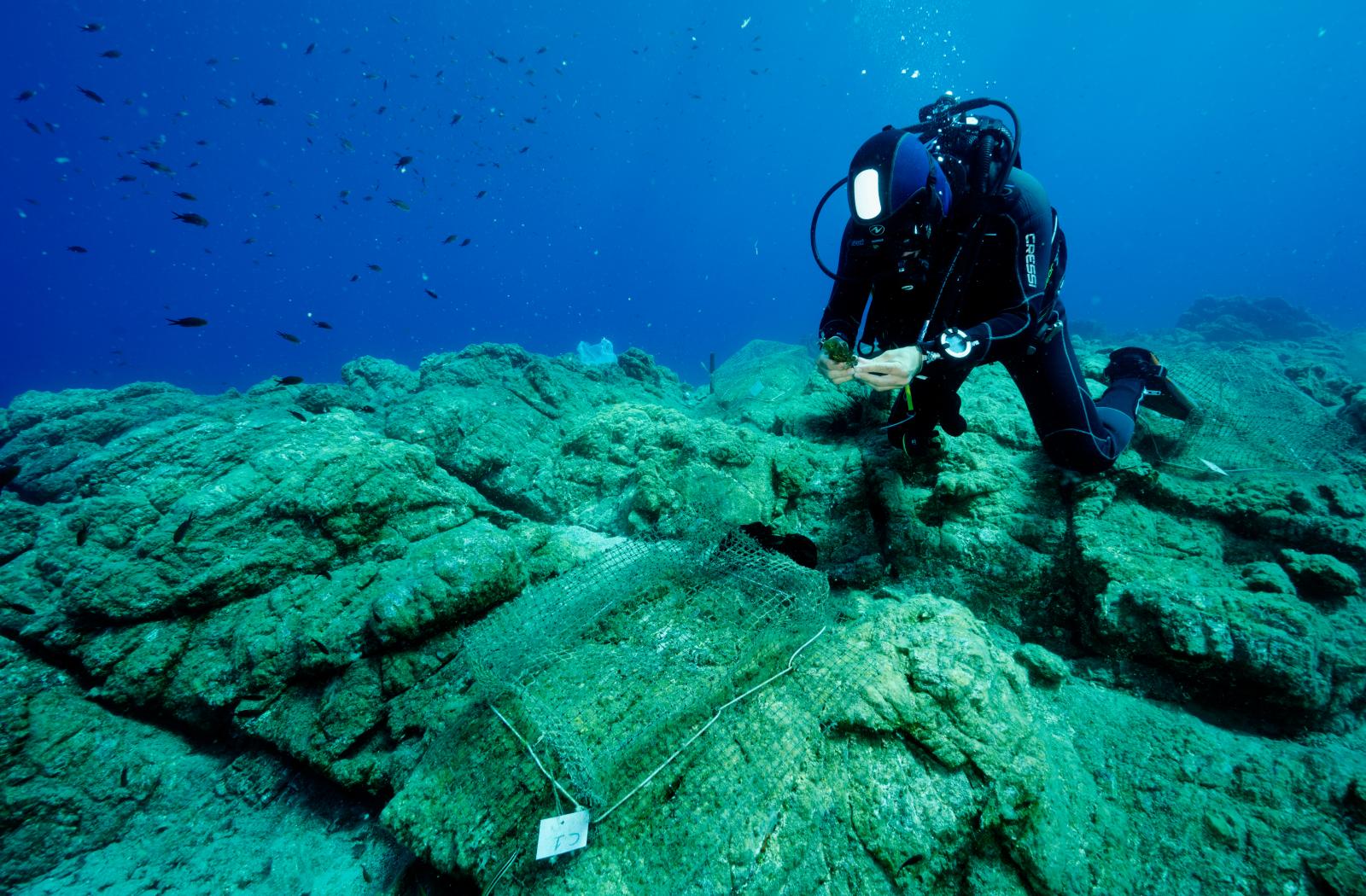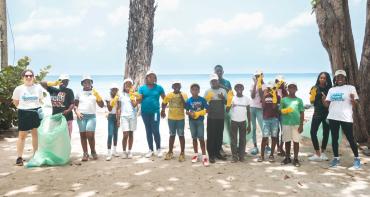The Commonwealth Blue Charter is highlighting case studies from the Commonwealth and beyond, as part of a series to spotlight best practice successes and experiences.

Share your own case study with us
“This programme is first class! It brings together the best tourism operators, who use sustainable practices, along with their crew. It not only brings their operations to the forefront of the tourism industry but also their well-trained crew are spread out through the community, teaching people all about our beautiful Great Barrier Reef. It is a fantastic programme for all involved, and the people who get to visit the Great Barrier Reef with these leaders are left with an above and beyond experience.” Sarah Vickory, Master Reef Guide.
Summary
The Master Reef Guides programme was launched in 2019. It builds the capacity of tourism staff working on the Great Barrier Reef in Queensland, Australia, to provide an appealing industry- and governmentrecognised qualification. Master Reef Guides pass through a comprehensive selection and training process.
These ambassadors can provide up-to-date information on the Great Barrier Reef, share stories on the World Heritage Area and explain what visitors can do to make a difference. Once qualified, they are recognised as worldclass reef guides, interpreters and story-tellers, well equipped to share the wonders of the Great Barrier Reef World Heritage Area with the all who visit.
The Master Reef Guides programme is delivered by the Great Barrier Reef Marine Park Authority (GBRMPA), the Association of Marine Park Tourism Operators (AMPTO) and Tourism and Events Queensland (TEQ). It is the first programme of its kind working on the issue of coral reefs. In 2018 and 2019, the first three cohorts of Master Reef Guides were trained in a range of areas, including public speaking, enhancing the visitor experience and the power of interpretation.
Coral reef tourism contributes $36 billion to the global tourism industry annually. Irresponsible reef tourism can put great pressure on coral health. However, responsible and informed operators can help educate and inform tourists, providing a more impactful, value-added experience with increased awareness. This case study describes one programme that is demonstrating success in contributing to the management and conservation objectives of the Great Barrier Reef, and that could be of interest for application in other regions.

The issue
The Great Barrier Reef tourism industry plays a vital role in presenting the wonders of this World Heritage Area to millions of people every year. Meanwhile, providing 65,000 full-time jobs, tourism is the largest employer in North Queensland. GBRMPA has worked on the Great Barrier Reef tourism industry for decades, with a focus on a healthy reef being equal to a healthy industry. Tourism operators represent not only the avenue for millions of people to experience the Great Barrier Reef each year but also the eyes and ears, the custodians and the interpreters of the Great Barrier Reef.
Great Barrier Reef tourism staff are in a unique position to share the wonders of the reef and interpret its complexity to a captivated audience. It has long been proven that people will protect what they know – and know what they experience. If we strive to connect each person who chooses to come and experience the Great Barrier Reef through sophisticated and memorable guiding and interpretation, then the global community can become involved in the future health of not only the Great Barrier Reef but also other natural places on which they rely directly.
GBRMPA encourages tourism operators to strive for the highest standards in protection, presentation and partnership towards the ends of environmental protection, reef resilience and tourism sustainability. Becoming a recognised High Standard Tourism Operator (an eco-accredited operator) comes with strong incentives, including longer-term operating permits (up to 20 years) and also being showcased by GBRMPA.
However, a 2015 audit of High Standard Tourism Operators showed up inconsistency and inaccuracy in some information delivered by tourism staff and highlighted an opportunity to improve interpretation and raise the bar across the entire tourism industry.
The response
The response was instigated in 2017, with the aim of developing “A highly desirable and internationally recognised guiding programme that builds the capacity, knowledge and presentation skills of the Great Barrier Reef tourism industry to deliver exceptional and memorable visitor experiences.”
The Master Reef Guides programme was launched in 2018 and provides training specific to coral reefs and the Great Barrier Reef. The programme was crafted from the experience of existing national and international guiding programmes, the tourism sector, protected area managers and marketing experts.
Once nominated as the best of the best within a company, potential guides are shortlisted, interviewed and then selected. Successful nominees are connected to others in a small cohort to complete both online and in-field training.
The comprehensive Reef Discovery Course has been developed as a free online resource that covers the A-Z of all things Great Barrier Reef – and how best to share this knowledge with visitors. The course consists of 10 modules and represents a one-stop-shop that synthesises and describes the World Heritage values of the Great Barrier Reef and the latest science and management information in a contemporary format.
For the in-field training, the cohorts visit sites and receive training from experts including leading scientists, body language and public speaking specialists, professional guides from other regions, Traditional Owners, Marine Protected Area managers and several other field guiding experts.
Once qualified, the guides all wear a uniform, so they are recognisable, and become the key contact point on their operations for information relating to species identification, ecosystem interpretation, protection of values, best practice visitor management and coral reef health.
Partnerships and support
The programme is a partnership between:
GBRMPA – bringing reef management and knowledge;
AMPTO – the industry association; and
TEQ – the government marketing and experience development department.
The programme is in the implementation phase. Up to 2021, the programme managers will learn from experience, feedback surveys, evaluations, research and guest reviews to continue to improve. The aim is for the programme to be sustainable by 2022 with annual regional training and quarterly master classes.
Results, accomplishments and outcomes
Currently, 63 Master Reef Guides have been trained in four cohorts and are now working along the Great Barrier Reef. It is anticipated there will be around 150 Master Reef Guides trained by 2022.
Master Reef Guides are considered the best in their field in relation to reef interpretation, master story-telling and experience delivery.The Master Reef Guides programme includes on-going training, networking and leadership development to assist the guides and other staff along the Great Barrier Reef to further develop their knowledge and experience. Not everyone is selected to undertake the training to obtain the qualification; however, all Master Reef Guides will play the role of leader and mentor for other staff within their operation and across the tourism industry.
Master Reef Guides provide their tour operators with the capacity to raise the level of service and visitor experience – delivering benefits for the industry, visitors and the Great Barrier Reef itself.
The goal of the programme is to have a Master Reef Guide on every High Standard Tourism Operation that visits the Great Barrier Reef – setting the standard for tourists to receive the best possible experience. The programme is enabling the industry to play an active role in the protection of the Marine Park through the provision of reporting and compliance training.
The online Reef Discovery Course is available to guides and interested members of the public. Registration is possible by contacting: E-mail
Challenges
An audit of tourism operators highlighted inconsistency and inaccuracies in the information being delivered by tour guides. Improving the level of information provision was a critical element contributing to responsible, sustainable tourism practices on the Great Barrier Reef.
Adapting the content of the programme to evolve as knowledge improves is a challenge. It requires an adaptive learning approach that includes monitoring and evaluation of the different components to ensure the programme continues to provide the most relevant, upto-date information.
Managing the increasing demand from operators as the programme gains traction and becomes embedded in marketing and promotional strategies has required the establishment of a strong governance framework, open and transparent selection processes and quality assurance checks.
Ensuring the quality and knowledge of guides requires on-going management, engagement and training opportunities. Retaining staff and keeping the newly increased capacity within the Great Barrier Reef also represents a challenge. Key lessons learnt Developing a professional network and community of best practice has been vital. Maintaining a close network of best practice among the guides and trainers has been key and has been achieved by utilising social media and group communication channels. The training is developing a peer support and continuous learning network among Master Reef Guides, who continue to remain in contact after the training. Trainers also become part of the closed social channels and exchange knowledge, latest findings and advice via these and on their terms.

The programme has also developed a career pathway and opportunity for females in a male-dominated industry.
On-going training is important: the intention is to maintain a programme of master classes on different issues, to ensure the Master Reef Guides remain current as knowledge evolves. Master Reef Guides are kept abreast of the latest science to ensure they can address guest questions.
It has been found that wearing a uniform is important, both for the Master Reef Guides, in recognition of the professional qualification they have achieved, and as a visual message to visitors. The Master Reef Guides brand has enabled marketing bodies to support and promote a brand that represents quality and a focus on visitor experience delivery, without linking or promoting a specific business.
Retaining engagement of all partners is critical to ongoing success: the programme has to work with and for GBRMPA, individuals undertaking the programme, their employers and tourists.
Working with traditional owners is helping create links and reconcile conflict between traditional custodians of the reef and the industry that depends on it.
Ensuring all material related to the programme is developed with a quality lens is critical to the success of managing a shared brand: communication materials, media interviews and guide promotion and presentation are maintained through a central business manager. Given the global focus on the health of the Great Barrier Reef, responses to media must be timely but accurate and balanced. The establishment of key messages, talking points and media training has maximised reach and message delivery.
When people are the key to implementation of a programme, managing relationships is the way to success. Connecting and sharing among the network has allowed all to play a role in the development of the programme, and all feel a sense of ownership, commitment and pride in the Master Reef Guides.
Lead contact
Fiona Merida, Assistant Director Reef Stewardship, Great Barrier Reef Marine Park Authority
Source
Materials provided by Fiona Merida – image credit Pablo Cogollos http://www.gbrmpa.gov.au/our-partners/master-reefguides https://www.icriforum.org/news/2019/03/great-barrierreef’s-first-master-reef-guides
Download this case study (PDF)
View all Case Studies
Media contact
- Josephine Latu-Sanft Senior Communications Officer, Communications Division, Commonwealth Secretariat
- +44 20 7747 6476 | E-mail



